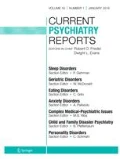Abstract
The disorder currently known as attention-deficit disorder (ADD) or attention-deficit/hyperactivity disorder (ADHD) is now recognized by most clinicians as a legitimate and widely prevalent disorder among children and adults. Yet there is still widespread misunderstanding as to the disorder’s nature. Many clinicians mistakenly continue to think of this as a behavior disorder characterized by hyperactivity in children and excessive restlessness or impulsivity in adults. In fact, ADD/ADHD is essentially a cognitive disorder, a developmental impairment of executive functions (EFs), the self-management system of the brain. Although EFs are complex, their impairment constitutes a syndrome that can be recognized readily in clinical practice; impaired EF involves a pattern of chronic difficulties in executing a wide variety of daily tasks. Once recognized, this disorder can be effectively treated in most cases. In this article, I describe the nature of EF impairments in ADD/ADHD and how the syndrome can be recognized and effectively treated in clinical practice. (Note: The term ADHD is used in the balance of this article to refer to both inattentive and combined subtypes.)
Similar content being viewed by others
References and Recommended Reading
Brown TE: Attention Deficit Disorder: The Unfocused Mind in Children and Adults. New Haven, CT: Yale University Press; 2005.
Brown TE: Executive functions and attention deficit hyperactivity disorder: implications of two conflicting views. Int J Disabil Dev Educ 2006, 53: 35–46.
Barkley RA: Attention-Deficit Hyperactivity Disorder: A Handbook for Diagnosis and Treatment, edn 3. New York: Guilford Press; 2006.
Barkley RA, Murphy KR, Fischer M: ADHD in Adults: What the Science Says. New York: Guilford Press; 2008.
Kessler RC, Adler L, Barkley R, et al.: Prevalence and correlates of adult ADHD in the United States: results from the National Comorbidity Survey Replication. Am J Psychiatry 2006, 163: 716–723.
Baxter MG, Murray EA: The amygdala and reward. Nat Rev Neurosci 2002, 3: 563–573.
Phelps E: The interaction of emotion and cognition: the relationship between the human amygdala and cognitive awareness. In The New Unconscious. Edited by Hassin R, Uleman J, Bargh JA. New York: Oxford University Press; 2005: 61–76.
Faraone SV, Biederman J, Spencer T, et al.: Diagnosing adult attention deficit hyperactivity disorder: are late onset and subthreshold diagnoses valid? Am J Psychiatry 2006, 163: 1720–1729.
Biederman J, Petty C, Fried R, et al.: Impact of psychometrically defined deficits of executive functioning in adults with attention deficit hyperactivity disorder. Am J Psychiatry 2006, 163: 1730–1738.
Burgess PW: Theory and methodology in executive function research. In Methodology of Frontal and Executive Function. Edited by Rabbitt P. East Sussex, United Kingdom: Psychology Press Publishers; 1997: 81–116.
Rabbitt P, ed: Methodology of Frontal and Executive Function. East Sussex, United Kingdom: Psychology Press Publishers; 1997.
Barkley RA: ADHD and the Nature of Self-Control. New York: Guilford Press; 1997.
Brown TE, ed: Attention Deficit Disorders and Comorbidities in Children, Adolescents and Adults. Washington, DC: American Psychiatric Press; 2000.
Biederman J, Petty CR, Fried R, et al.: Can self-reported behavior scales assess executive function deficits? A controlled study of adults with ADHD. J Nerv Ment Disord 2007, 195: 240–246.
Sandra Kooij JJ, Marije Boonstra A, Swinkels SH, et al.: Reliability, validity, and utility of instruments for selfreport and informant report concerning symptoms of ADHD in adult patients. J Atten Disord 2008, 11: 445–458.
Brown TE: Brown Attention Deficit Disorder Scales for Adolescents and Adults. San Antonio, TX: The Psychological Corporation; 1996.
Ramsay JR, Rostain AL: Cognitive-Behavioral Therapy for Adult ADHD: An Integrative Psychosocial and Medical Approach. New York: Routledge; 2008.
Kessler RC, Adler LA, Barkley R, et al.: Patterns and predictors of attention-deficit/hyperactivity disorder persistence into adulthood: results from the National Comorbidity Survey Replication. Biol Psychiatry 2005, 57: 1442–1451.
Brown TE: ADHD Comorbidities: Handbook of ADHD Complications in Children and Adults. Washington, DC: American Psychiatric Press; 2008 (in press).
Author information
Authors and Affiliations
Corresponding author
Rights and permissions
About this article
Cite this article
Brown, T.E. ADD/ADHD and impaired executive function in clinical practice. Curr Psychiatry Rep 10, 407–411 (2008). https://doi.org/10.1007/s11920-008-0065-7
Published:
Issue Date:
DOI: https://doi.org/10.1007/s11920-008-0065-7




